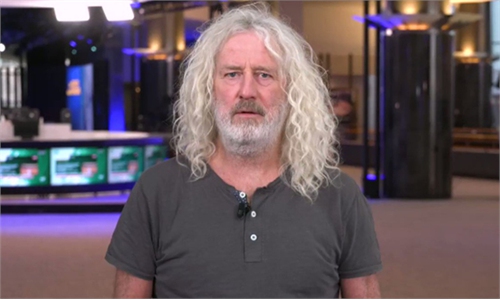Simplicity and commitment to words are the most impressive features of CPC members: Brazilian scholar

Evandro Menezes de Carvalho
Editor's Note:The Communist Party of China (CPC) will commemorate its 100th anniversary on July 1. What's the main factor that made the CPC always dynamic? Why can the Party lead the Chinese people to remarkable achievements in human history? Evandro Menezes de Carvalho (Carvalho), director of the Center for Chinese Studies at the Brazilian college Getulio Vargas Foundation, shared his views on these issues in a written interview with Global Times (GT) reporter Xu Hailin.
GT: The CPC was founded in 1921, three years after the end of World War I. The CPC has led China through various wars and the West's suppressions that aimed to isolate the country. It then took China to reform and opening-up, which has resulted in the country's remarkable prosperity. In your take, what does the CPC's success to repeatedly turn the table for China's destiny indicate?
Carvalho: I understand that five fundamental qualities explain the CPC's success: patience, resilience, intelligence, science and efficiency.
The countless adversities the Party has gone through would not be overcome if the leaders and all of its members had not had the necessary patience to withstand them and wait for the right moment to act to overcome them. In the book Up and Out of Poverty, Chinese President Xi Jinping mentions that one of the four pitfalls for young leaders is to be impatient for success. He underlines the importance of having a clear understanding of the situation.
Resilience is another formidable quality of the CPC. It can be understood both as the ability to adapt to the most difficult circumstances and the ability to start over even after having suffered the most severe humiliation and aggression and submitted to the most adverse conditions. It is as if the Party kept intact a "Chinese spirit" that sustains it every time foreign forces try to destroy its unity.
Third, intelligence. And here I am referring to the one that unites Chinese wisdom and approach to dealing with problems and seeking solutions. There is a Chinese way of thinking and acting in the face of conflicts. Chinese diplomatic language is much richer in its syntax, semantics, and pragmatics than Western diplomatic language.
Fourth, science. China has a tradition of scientific thinking that goes back to its classical thinkers. The notion of "seeking the truth from facts" and the policy of "scientific development" are legacies of this long-standing tradition. That combines with its leaders' thoughts, including Xi's thoughts on socialism with Chinese characteristics for a new era.
Finally, efficiency. The CPC has increasingly sought to strengthen its organizational structure and decision-making and task execution processes based on "efficiency" as a criterion. This is an essential aspect that has guided all Party policy and explains several changes that have taken place in recent years.
GT: The CPC uses the system of democratic centralism. In your opinion, what's the difference between the CPC and the Western parties that adopt an election system?
Carvalho: There are several differences. The first is that the CPC, as the ruling Party that founded the People's Republic of China, has the conditions to establish long-term goals and objectives. Furthermore, the Party assumes the most significant responsibility and prominence in the history of New China even though its leaders have a prominent position during their terms of office. In the West, the multi-party system and direct elections, despite having legitimacy elements, create difficulties for long-term plans. The party in power makes decisions taking into account a short term of office of four or five years to win the next election. Therefore, there are no incentives for elaborating public policies whose results will only obtain after the term of office. In this sense, Western parties are very short-sighted. The rationale that guides the decision-making process of Western political parties does not seek to improve the living conditions of the population but one that results in votes in the next election. Since the population votes taking into account the candidate and not his or her Party, there is also the risk of personalization of power and the emergence of populist politicians.
The CPC, as the ruling Party, is concerned with the effectiveness of its decisions. Fulfillment of the promises made to the population is an essential condition for the Party's legitimacy. For this reason, the Party always seeks to increase its capacity to implement the decisions taken. Democratic centralism contributes to the efficiency of its leadership. In the West, on the other hand, there is a growing deficit in the legitimacy of the parties due to their low capacity to carry out the promises made to the population. Furthermore, the continuity of projects initiated by the previous government runs the risk of being paralyzed by the successor government, especially if it belongs to an opposing party. Also, politicians seem to be more concerned with serving interest groups that can mobilize voters in the next election than serving the population as a whole. It is also worth noting that in the Western model, there is no guarantee that the bureaucracy will carry out the decision taken by the government until reaching the population directly. In Western democracies, the bureaucracy has become an "almost parallel power" given the ability to impede the fulfillment of decisions taken by the ruler if this ruler is a politician that the bureaucrat has no political sympathy for.
The CPC, also because of China's one-party model, is concerned about the ethical rigor of its cadres as corruption and immorality erode a party's legitimacy. The CPC has adopted stricter criteria for recruiting new members. And the Party has been much more rigorous in fighting corruption within its structure than political parties in Western democracies that have been very lenient with corruption practiced by their members. Also, economic power has systematically corrupted political parties in Western democracies.
GT: Despite China adopting a political system different from the West's, the CPC has always been people-centered. The Chinese government's handling of COVID-19 could be a justification. From your observation, how does the CPC manage to motivate itself to bring the Chinese people the best it can?
Carvalho: The CPC's history is the testimony of a party that was founded in defense of the interests of the Chinese people. It is not a party born from a formal foundation, but a party born in the struggle to defend the independence of the Chinese people in the face of external aggression and internal groups that did not have the capacity to resist foreign pressure. This makes all the difference when comparing the CPC with the parties of Western democracies. In this sense, the Chinese people know that the CPC has a greater commitment to maintaining the country's sovereignty and territorial integrity. In the case of a pandemic, the enemy is a virus, invisible and deadly. A sense of collectivity and unity, and an understanding of the importance of strong leadership in dealing with this challenge, were essential to the CPC to bring the Chinese people the best it can.
GT: Most officials in the Chinese governments are CPC members. In your personal experience of interacting with them, what of their characteristics has impressed you the most?
Carvalho: The most impressive feature is the simplicity and, above all, the commitment to the word as an ethical principle in the personal relationships established by them. About the first feature, simplicity shows that CPC members are not concerned with manifesting signs of wealth as symbols of power. Their awareness of their power seems outweighed by their awareness of their duty to exercise their functions. And the notion of "duty" as the central element of their actions and decisions may naturally impose more remarkable restraint in the exercise of power. And the second element I mentioned, respect for the word given, seems to be the essential building block of the entire institutional architecture of power of the CPC and the basis of its legitimation.
GT: China resolutely believes that countries with different political systems can coexist, and it has emphasized win-win aims during its development. However, the US and some Western countries have been attempting to weaken China with measures such as color revolutions and piling up military pressure. What risk will US suppression of China bring to the whole world?
Carvalho: It brings several risks. The first is the negative impact on the world economy itself. One thing is the market competition between the US and China; quite another is an American action to create social and economic instabilities in China, increasing the tension between the two countries with risks for more serious conflicts. An escalation of tensions and mutual aggressive actions will affect the entire world. There must be respect for UN principles. In this sense, the US should abandon the Cold War discourse, stop facing China as an enemy, and play the game of competition according to the rules of international law and good diplomacy without putting humanity at risk.



